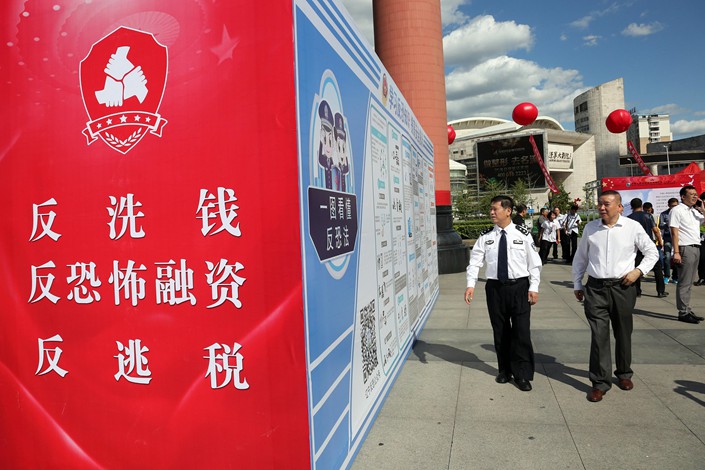China Needs to Do Better Collecting Data on Money Laundering, Agency Says

An international group set up to combat money laundering has urged China to improve the way it collects intelligence, following scandals in which Chinese banks failed to prevent such offenses.
“China has the foundation for a sound system to tackle money laundering and terrorist financing, but should strengthen its financial intelligence unit and use of financial intelligence,” the Financial Action Task Force (FATF) said in a statement last Thursday.
The FATF, based in Paris, is an intergovernmental organization that sets standards and promotes countermeasures against money laundering, terrorist financing and other financial crimes. It currently has 38 members including the United States, Australia and the European Commission.
The FATF’s anti-money laundering standards are “rather high and difficult” for any country to fully comply with, a source close to the regulators told Caixin.
“But no countries have other options but to enforce the standards, because otherwise they would be put on a blacklist and be subject to severe international sanctions, or a ‘gray list’ facing financial sanctions worldwide,” which could lead to various restrictions on the overseas accounts and businesses of their individuals and companies, the source said.
The statement last week was issued after its decision-making body, the plenary, discussed an assessment of China’s compliance of its standards. The assessment is part of its mutual evaluation reports, which are peer reviews of each of the FATF’s members on an ongoing basis to assess their implementation of its recommendations to prevent criminal abuses in their financial systems. The FATF is expected to release its full report on the evaluations of China in April.
The financial intelligence unit, as the FATF pointed out in the 2012 evaluation report, refers to the China Anti-Money Laundering Monitoring and Analysis Center run by the country’s central bank, which hosts an electronic system for commercial banks to report suspicious transactions.
An official with China’s financial regulator, who declined to be named, told Caixin that the FATF is concerned that although the country has rules in places to fight money-laundering, its law enforcement measures are less than satisfactory.
“The biggest challenge for China is that whether the system we have built according to international standards can generate effects as expected.”
The reputation of China’s state-owned financial institutions has been tarnished in recent years after their overseas operations made global headlines when they were punished by foreign governments for violating money-laundering laws.
In 2016, several senior executives at the Madrid branch of China’s largest bank, Industrial and Commercial Bank of China Ltd. (ICBC), were arrested on suspicion of money laundering.
In the same year, the Agricultural Bank of China Ltd. was sanctioned by the Federal Reserve with a $215 million penalty for violating a similar anti-money laundering law.
In May last year, the U.S. unit of ICBC agreed to pay $6.16 million in fines to American regulators for insufficient measures to prevent money laundering.
Contact reporter Timmy Shen (hongmingshen@caixin.com)

- 1Cover Story: China Carves Out a Narrow Path for Offshore Asset Tokenization
- 2Drownings Shake Chinese Enthusiasm for Travel to Russia
- 3China Business Uncovered Podcast: A $15 Billion Bitcoin Seizure and the Fall of a Cybercrime Kingpin
- 4Over Half of China’s Provinces Cut Revenue Targets
- 5Li Ka-Shing’s Port Empire Hit by Forced Takeover Amid Panama Legal Dispute
- 1Power To The People: Pintec Serves A Booming Consumer Class
- 2Largest hotel group in Europe accepts UnionPay
- 3UnionPay mobile QuickPass debuts in Hong Kong
- 4UnionPay International launches premium catering privilege U Dining Collection
- 5UnionPay International’s U Plan has covered over 1600 stores overseas






